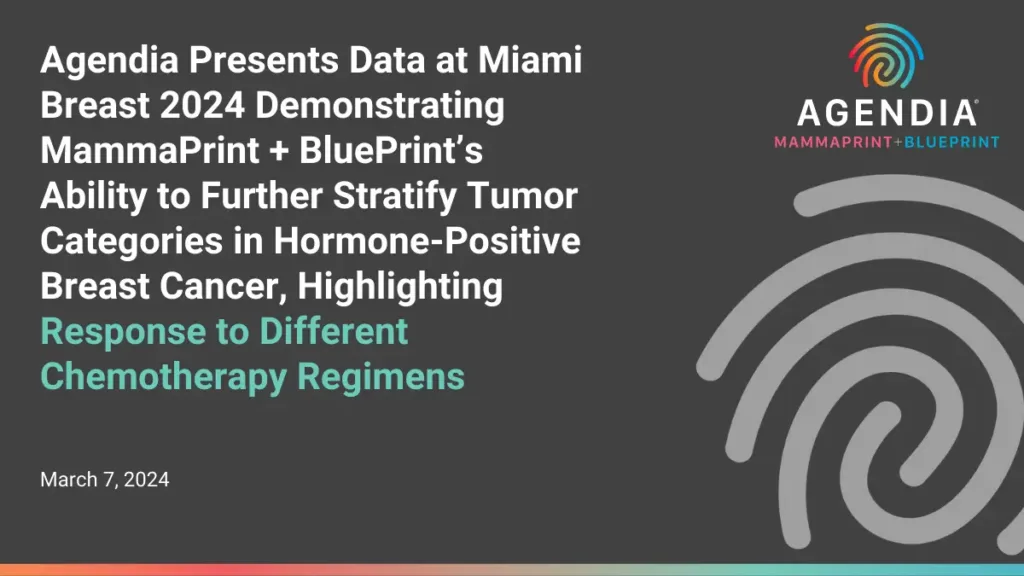
Studies from the FLEX Trial indicate utility of MammaPrint to predict chemotherapy benefit, continue to provide deeper insights for customized treatment plans based on genomic risk and subtypes
IRVINE, Calif. & AMSTERDAM, Netherlands (March 7, 2024) – Agendia®, Inc., announced today it will share new data from the ongoing prospective, observational FLEX Trial (NCT03053193) in two poster presentations at the 41st Annual Miami Breast Cancer Conference (MBCC), taking place March 7 – 10th, 2024.
The first poster, titled MammaPrint® and BluePrint® predict anthracycline chemosensitivity in patients with HR+HER2-early-stage breast cancer enrolled in FLEX, (Audeh, W., et al.), investigates the associations between MammaPrint and BluePrint classifications, therapy regimen, and the likelihood of achieving a pathologic Complete Response (pCR). Researchers looked at patients who had hormone receptor-positive (HR+), Human Epidermal Growth Factor Receptor (HER) 2-negative early-stage breast cancer – categorized as MammaPrint High Risk – who had been treated with either a combination of two (taxane and cyclophosphamide, TC) or three (TC with anthracycline, AC-T) types of neoadjuvant chemotherapy. Patients were then further stratified into MP High 1 and High 2 categories, and further stratified by BluePrint subtype of Luminal and Basal. Results showed that patients with MP High 2 tumors, including Luminal B and Basal subtypes, are more likely to achieve a pCR in response to AC-T, while the addition of anthracycline to the therapy regimen does not appear to improve pCR rates for patients with MP High 1, Luminal B-type tumors.
The second poster, titled Prediction of chemotherapy benefit by MammaPrint® in patients with HR+HER2-early-stage breast cancer from real-world evidence studies (Audeh, W., et al.), used data from patients with HR+ HER2-negative early-stage breast cancer enrolled in the FLEX and NBRST trials to generate a prediction of the magnitude of chemotherapy benefit based upon a patient’s genomic risk, looking at the MammaPrint index more closely as a continuous variable. Researchers examined the association of the MammaPrint index with benefit from chemotherapy by evaluating two clinical endpoints, the likelihood of pCR in response to neoadjuvant chemotherapy, and the five-year outcome among patients who received chemotherapy and endocrine therapy or endocrine therapy alone.
Consistent with results found in the landmark MINDACT trial, this study showed that the MammaPrint index demonstrates strong efficacy in predicting low chemosensitivity in Low Risk and Ultra Low Risk tumors, reinforcing that these groups do not derive significant chemotherapy benefit. However, it was also observed that chemotherapy effectiveness increased as MammaPrint risk increased in High 1 and High 2 tumors, as evidenced by both pCR rates and 5-year outcomes, demonstrating that the overall benefit of chemotherapy increases as MammaPrint risk increases. Taken together, these findings indicate the utility of MammaPrint to predict neoadjuvant and adjuvant chemotherapy benefit in this patient population.
“In this unique real world evidence FLEX study, we were able to look at chemosensitivity for patients who had received neoadjuvant treatment and the chemo benefit for patients who are treated with systemic therapy after surgery, showing that MammaPrint is predictive of chemotherapy benefit in both cases. The FLEX Trial, with over 16,000 women enrolled, is now allowing us to look at clinical outcomes as well as analyzing whole transcriptome data,” said William Audeh, MD, MS, Chief Medical Officer of Agendia. “The data we’re sharing at the Miami Breast Cancer Conference confirms that gene expression profiling with these assays identify who may benefit from chemotherapy, and may prove helpful in regimen selection as well. We look forward to further exploring the capabilities of MammaPrint and BluePrint for women across the entire spectrum of breast cancer risk and subtype.”
The goal of Agendia’s research is to increase the likelihood of managing each individual’s cancer diagnosis by delivering a customized treatment plan to the patients most likely to benefit based on the unique features of their tumor.
About Agendia
Agendia is a leading provider of innovative solutions in the field of precision oncology. With a focus on early-stage breast cancer, Agendia offers reliable biological insights that inform personalized treatment decisions for patients and their care teams. Their advanced genomic assays, MammaPrint® + BluePrint®, enable clinicians to quickly identify the most effective treatment plan, minimizing the risk of both under- and over-treatment.
Founded in 2003 in Amsterdam, Agendia is headquartered in Irvine, California with a state-of-the-art laboratory facility. Led by world-renowned scientists and oncologists, Agendia is committed to advancing genomic insights through ongoing research. This includes the notable FLEX Study– the world’s largest whole transcriptome Real-World Evidence-based Breast Cancer database which aims to revolutionize precision in breast cancer management. With cutting-edge technology, research and innovation, Agendia strives to shape the future of precision oncology and make a significant impact in the fight against breast cancer.
About MammaPrint
MammaPrint® is a gene expression profiling test that reveals the distinct underlying biology of an early-stage tumor to determine its risk of spreading. As the only FDA-cleared gene expression profiling test to assess a woman’s risk of distant metastasis, MammaPrint® provides critical answers that help inform the future of woman’s treatment plan at the point of diagnosis, including the timing and benefit to chemotherapy and endocrine therapy, MammaPrint® listens to the signals from 70 key genes in a woman’s tumor to stratify her risk within four distinct categories – ranging from UltraLow, Low, High 1, and High 2– to fuel a right-sized care plan tailored to her biology and her life’s plans.
About BluePrint
BluePrint® is a gene expression profiling test that reveals the driving forces behind a tumor’s growth at the earliest stage possible in a woman’s breast cancer care journey to help optimize and personalize treatment planning. As the only molecular subtyping test available in the U.S., BluePrint® goes where pathology cannot, offers critical insights that providers may otherwise have not known to act on, and gives women the best chance to return to a life not defined by cancer. BluePrint® measures the activity of 80 key genes that are involved in a tumor’s growth to classify a tumor as Luminal-type, HER2-type, or Basal-type, each of which warrant distinct treatment pathways. By revealing the distinct underlying biology of a woman’s tumor, BluePrint® can catch often misclassified, yet highly aggressive, Basal tumors, so women can be prescribed the most appropriate treatment from the start.
Media Contact


